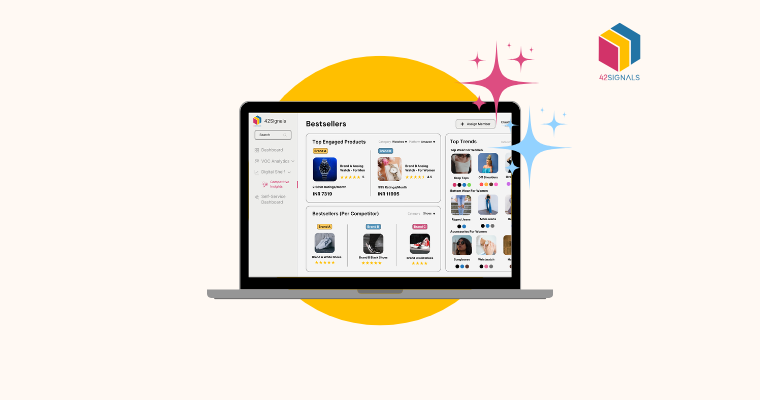As the online market continues to expand, e-commerce businesses face more competition and higher expectations from customers. To succeed in this environment, companies need more than a great website or a strong product lineup. They need a robust toolkit that supports everything from data analysis and automation to customer engagement and personalized marketing. By integrating these eCommerce tools into their operations, businesses can streamline workflows, improve customer experiences, and, most importantly, drive growth.
In this guide, we’ll explore the must-have eCommerce tools of 2025, focusing on platforms that boost analytics, automate repetitive tasks, enhance customer service, and refine marketing strategies.
Each tool plays a distinct role in creating a well-rounded e-commerce ecosystem, and together they provide the infrastructure needed for sustainable growth.
What Are The Top ECommerce Tools for 2025?
1. 42Signals: Transforming Data into Actionable Insights
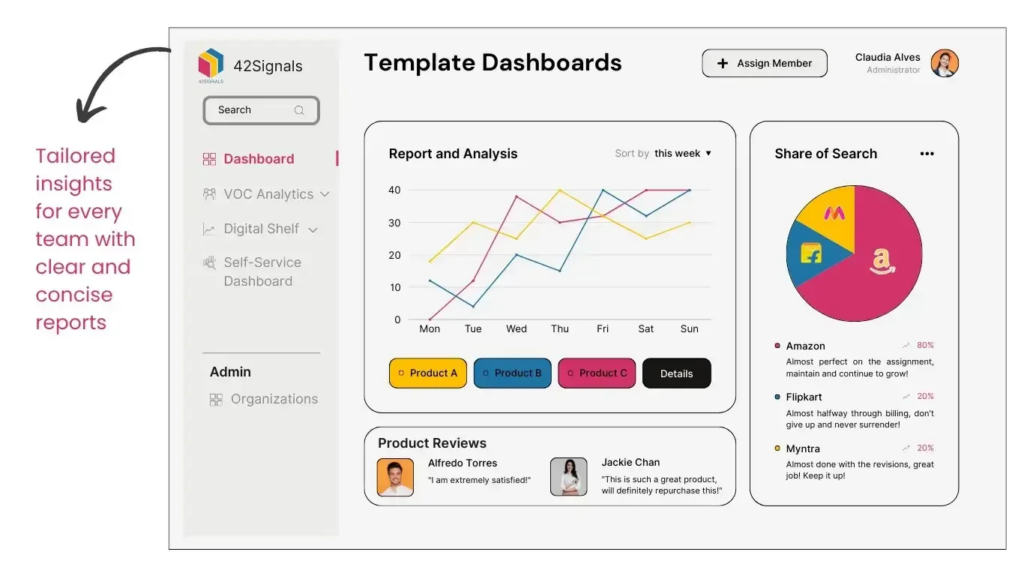
42Signals is a top digital shelf analytics and insights platform designed specifically for e-commerce businesses looking to make smarter, data-driven decisions. The platform excels at capturing, organizing, and presenting vast amounts of data in a way that is accessible and easy to interpret.
For e-commerce businesses, the ability to understand customer behavior, monitor pricing trends, and anticipate competitor strategies are essential for staying on top of the segment, and the 42Signals ecommerce tool makes this possible by transforming raw data into valuable insights.
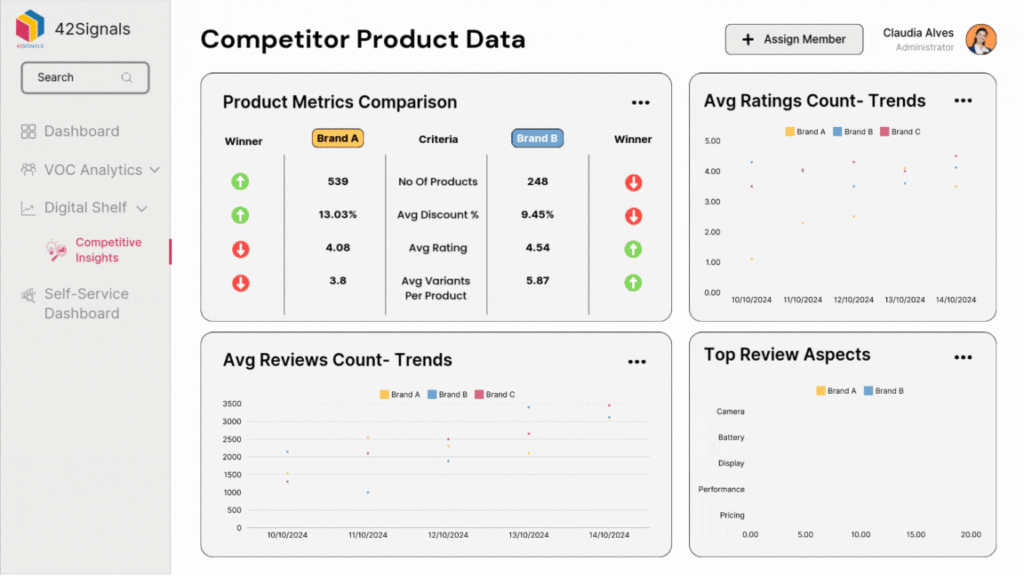
Here’s what sets 42Signals apart:
- Real-Time Data Analysis: In the fast-paced online shopping world, businesses benefit from immediate insights into how customers are interacting with their products. 42Signals provides real-time data tracking, allowing teams to monitor pricing trends, MAP violations, and new trends emerging from online platforms.
- Customer Segmentation: With the ability to understand customer data and feedback, 42Signals offers a clear view of who makes up the business’s audience and what they feel. This positive and negative sentiment segmentation enables more precise improvements and tailored marketing efforts.
- Competitive Market Analysis: Staying competitive requires knowing what others in the market are doing. 42Signals includes features for tracking competitor trends and analyzing industry shifts, ensuring businesses can adjust strategies to maintain their market position.
- Predictive Analytics: Beyond past performance, 42Signals uses artificial intelligence to forecast upcoming inventory and product trends. This allows businesses to plan product launches, inventory needs, and marketing strategies with foresight, anticipating customer demand more accurately.
42Signals is a great eCommerce tool that shines when it serves as the foundation of an e-commerce strategy. By offering in-depth insights into both customer data and broader market trends, it helps businesses make informed, strategic choices that drive growth.
2. Shopify: An All-in-One Platform for E-commerce Operations

Image Source: Shopify
Shopify is one of the most popular platforms for setting up and managing online stores, thanks to its wide-ranging functionality and ease of use. It’s designed to support businesses of all sizes, providing eCommerce tools for everything from website building to order processing and inventory management.
- Website Design and Product Listings: Shopify offers a user-friendly website builder that includes customizable templates and product listing tools. This makes it easy for businesses to create attractive storefronts and showcase their products.
- Sales and Marketing Features: With built-in options for promotions, discounts, and cross-selling, Shopify supports sales growth by making it easy to engage customers and encourage purchases.
- App Marketplace and Integrations: Shopify’s app marketplace includes a vast selection of third-party tools, enabling businesses to connect Shopify with platforms like Klaviyo, Zendesk, and Google Analytics 4, creating a cohesive tech stack.
Shopify’s straightforward setup and scalability make it a solid choice for both new businesses and larger companies looking for a stable platform that can grow with them.
3. Klaviyo: Personalizing Customer Engagement Through Automation
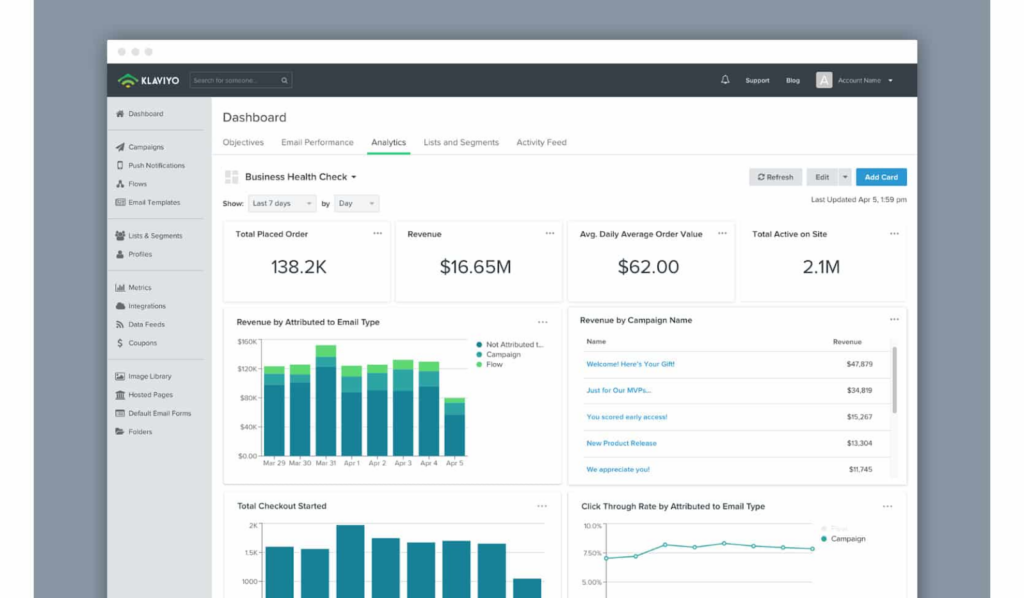
Image Source: Data Scientist
Klaviyo is a powerful ecommerce tool for email and SMS marketing that specializes in delivering personalized communication based on customer behavior and preferences.
With Klaviyo, businesses can keep their customers engaged at every stage of the buying journey through automated and data-driven campaigns.
- Segmentation and Targeted Campaigns: Klaviyo’s audience segmentation capabilities allow businesses to divide customers into targeted groups based on their behavior, past purchases, and interaction with marketing materials. This enables highly relevant messaging.
- Automated Workflows: From welcome emails for new customers to reminders for abandoned carts, Klaviyo enables businesses to automate communication, improving engagement and encouraging repeat purchases.
- Data-Driven Campaign Optimization: With Klaviyo’s real-time analytics, businesses can measure the effectiveness of their campaigns and make adjustments as needed, ensuring that each message resonates with its intended audience.
Klaviyo’s focus on personalization and automation makes it an essential tool for e-commerce companies aiming to improve customer engagement and retention through thoughtful, timely communication.
4. Zendesk: Enhancing Customer Service and Support
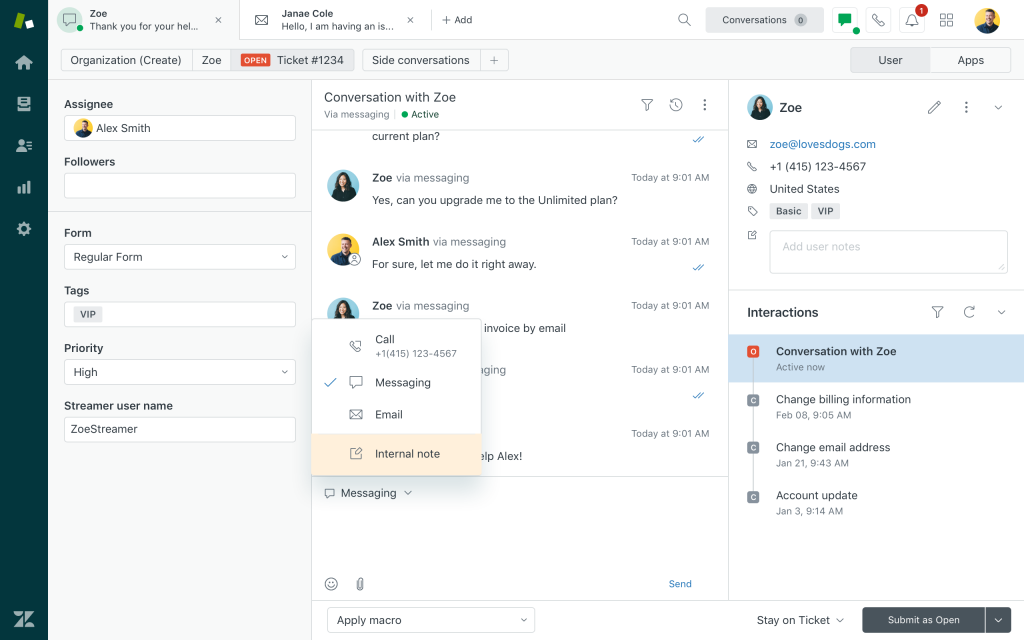
Image Source: GetVoip
Exceptional customer service is key to building loyalty, and Zendesk helps e-commerce businesses deliver quick and consistent support. By consolidating customer inquiries and support channels, Zendesk allows customer service teams to resolve issues more efficiently and create positive experiences for shoppers.
- Unified Communication: Zendesk pulls customer interactions from multiple channels—such as email, chat, and social media—into a single platform, allowing support teams to manage all conversations in one place.
- Automated Support: Zendesk uses AI to provide automated responses to common questions, freeing up human agents to handle more complex issues. This speeds up response times and improves customer satisfaction.
- Customizable Support Options: Zendesk allows businesses to tailor their support setup, offering options like live chat, help centers, and ticket tracking, which help meet customer needs across different touchpoints.
Zendesk’s customer service capabilities make it an indispensable ecommerce tool for businesses aiming to create strong relationships with their customers, providing quick, efficient, and personalized support.
5. Google Analytics 4: Essential Traffic and Engagement Tracking
Google Analytics 4 (GA4) is the latest version of Google’s popular analytics ecommerce tool, designed to provide deeper insights into user journeys and website engagement.
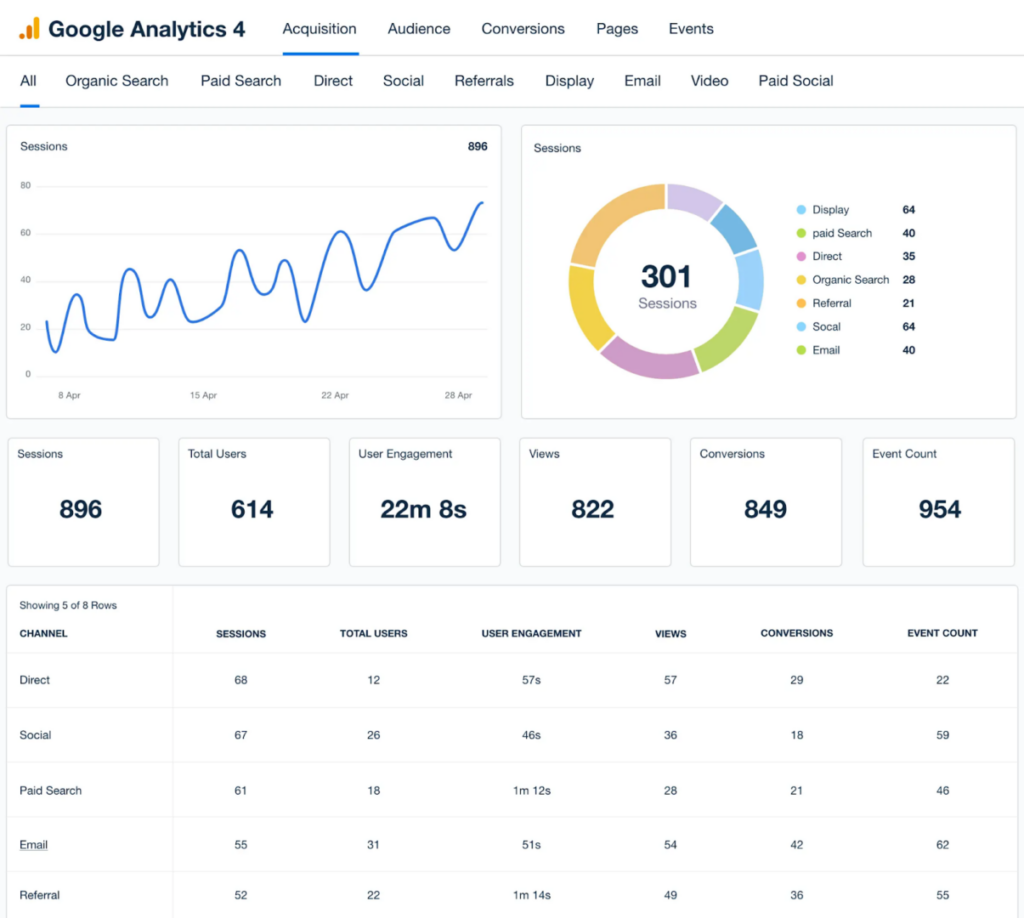
Image Source: Agency Analytics
For e-commerce businesses, GA4 helps track customer interactions across various channels, providing a broader view of how customers find and engage with the site.
- Comprehensive User Tracking: GA4 tracks users across devices and channels, giving businesses insights into customer journeys from initial contact to conversion, even if customers switch devices.
- Enhanced Event Tracking and Goals: GA4 allows businesses to set up custom events, such as button clicks or video plays, making it easier to understand specific customer actions that lead to conversions.
- Marketing and Advertising Insights: With detailed reports on acquisition channels, businesses can see where traffic is coming from and which marketing efforts are driving conversions, helping to refine ad strategies.
By using Google Analytics 4, e-commerce businesses gain valuable insights into how well their marketing and website strategies are working, allowing for continuous optimization based on real user behavior.
Conclusion:
Each of these eCommerce tools—42Signals, Shopify, Klaviyo, Zendesk, and Google Analytics 4—offers unique benefits that contribute to a successful e-commerce strategy. When integrated, they form a powerful system that captures and utilizes data across all areas of e-commerce, creating a streamlined, data-informed approach to online business.
With this combination of tools, businesses can:
- Build a Holistic View of Customers: Integrating customer data from 42Signals, Shopify, and Google Analytics 4 provides a complete picture of customer behavior and preferences.
- Deliver Personalized Messaging and Support: Klaviyo’s marketing automation combined with Zendesk’s support capabilities ensures that customers receive relevant communication and fast, efficient service.
- Optimize Inventory and Campaigns: With predictive analytics from 42Signals and event tracking from GA4, businesses can make better-informed decisions about inventory, promotions, and customer engagement.
In 2025, e-commerce success will depend on being agile, customer-centered, and data-driven.
By adopting these essential tools, businesses can ensure they’re ready to meet customer expectations, stay competitive, and drive lasting growth. If you are curious to try an all-encompassing eCommece tool for your business, schedule a demo with us today.

